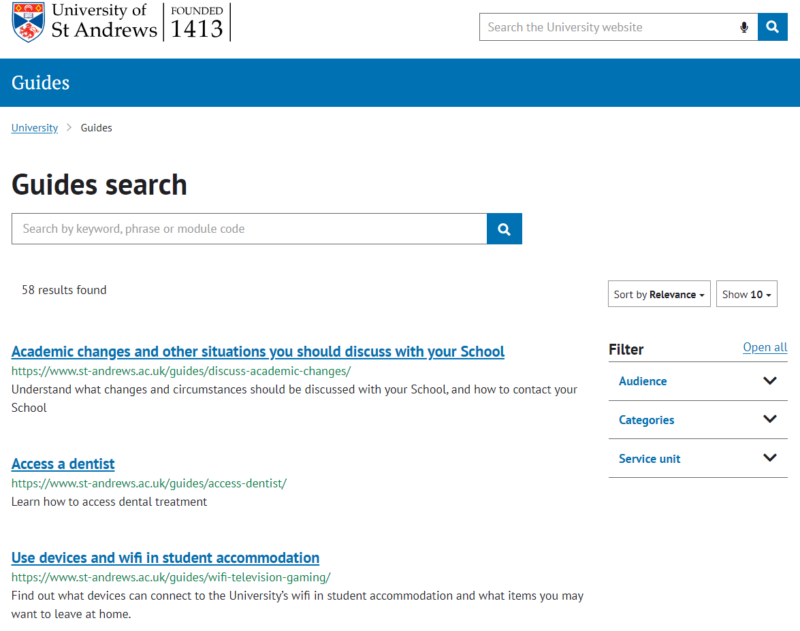Revolutionising web content management: introducing ‘guides’
The Digital Communications Team has embarked on a project to transfer much of the University website content into ‘guides’ to address potential reputational risks and compliance issues that have arisen over time.
Maintaining a consistent and up-to-date online presence has become a big challenge due to a mix of outdated and newly designed web content. This inconsistency has not only caused confusion among users, but has also led to potential reputational risks and compliance issues. To address these challenges, we have embarked on an innovative project: the creation of ‘guides’.
What are ‘guides’?
Guides are a new type of web content designed to replace traditional webpages on the University’s website. Created using the Terminalfour (T4) content management system, guides are modular, flexible, and optimised for search engines. Unlike standard webpages, which are static and bound within a web hierarchy, guides can be dynamically reused across different contexts, making them an ideal solution for the University’s diverse and evolving information needs.
Guides can also be tagged with data that will allow them to be filtered by users according to the audience and category when searching, for example, ‘show all guides for University staff that relate to finance’. In the long term, it is hoped that guides can be aggregated with other related content, for example, ‘show the relevant University policies that are associated with a particular guide’.
The problem with current web content
The existing web content at St Andrews has several issues:
- Duplicated and outdated information: many pages contain duplicated content, leading to misinformation and outdated material.
- Decentralised management: more than 200 staff members have editing access, leading to non-compliance with accessibility laws and potential security risks.
- Complex navigation: the vast number of pages and complex navigation systems overwhelm users and create high server loads, impacting both user experience and the environment.
- Hard to find content: users are presented with content that is directed at different audiences. Users then have to spend time working out which content is relevant to them.
The benefits of implementing guides
The shift towards using guides is aimed at simplifying the University website by:
- Enhancing findability and user experience: with clear, action-based language and optimised search features, guides make it easier for users to find and access the information they need.
- Reducing redundancy: by consolidating information and removing duplicated content, guides streamline content management and improve the consistency of the user experience.
- Compliance and security: guides adhere to accessibility standards and web best practices, reducing legal risks and enhancing the security of the web content.
- Improved search results: having content that is tagged with the audience and business function will enable users to quickly find the content they need.
Key strategies and future plans
The implementation of guides is supported by a comprehensive communication plan aimed at both internal stakeholders and the wider University community.
Key strategies include:
- Targeted communication: using newsletters, blogs, and meetings to explain the benefits and roadmap for guides.
- Gradual rollout: starting with critical areas like student services and staff finance, the rollout will be strategic and phased.
- Continuous feedback and improvement: incorporating feedback from users and analytics to refine and enhance guides.
Conclusion
The introduction of guides represents a significant step forward in the University’s digital strategy. By centralising content management and optimising web content, guides can improve the effectiveness of the University’s web presence and the way it communicates online.
This initiative not only supports the University’s commitment to providing a world-class educational experience, but also enhances its reputation as a forward-thinking institution.
